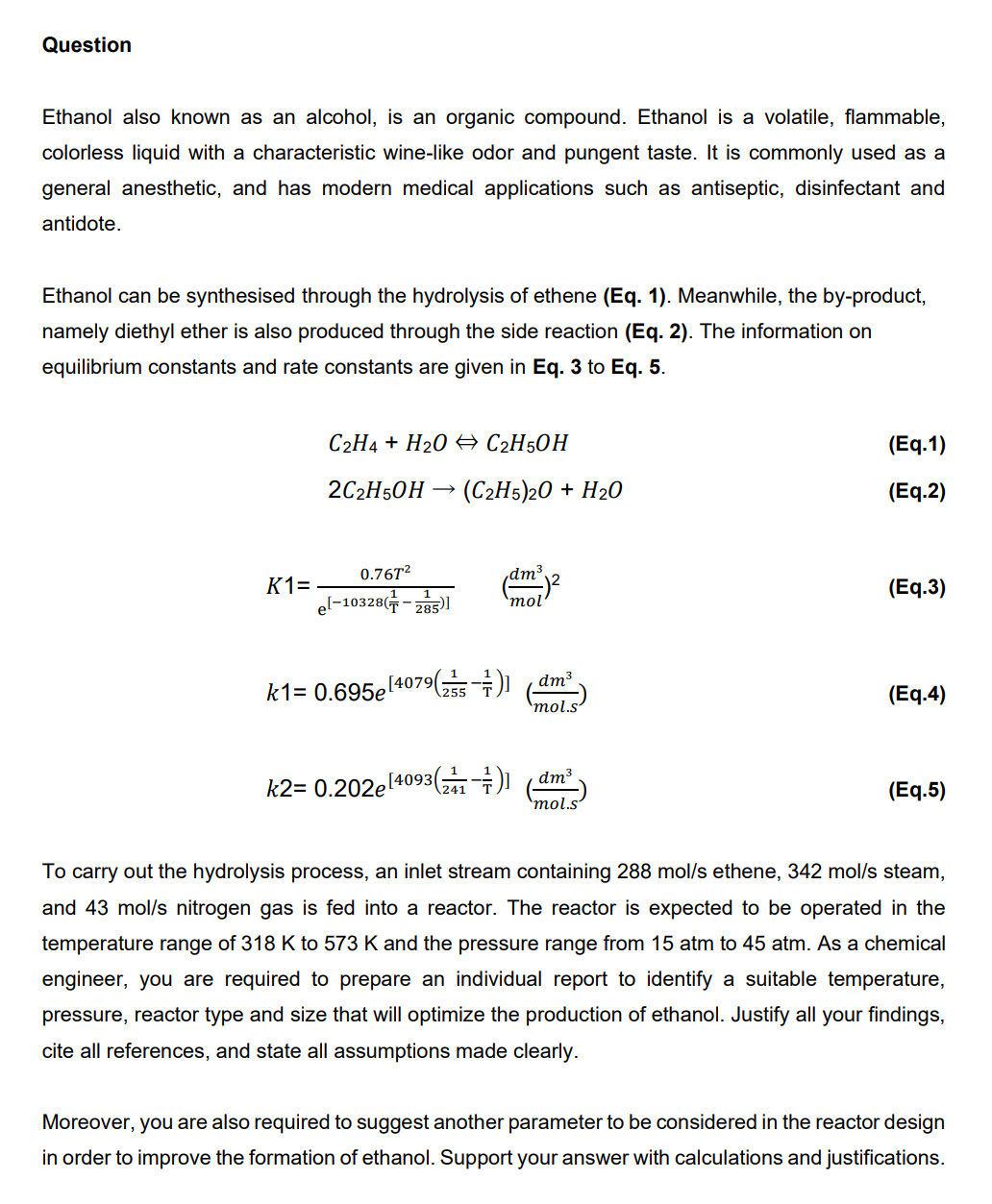Home /
Expert Answers /
Chemical Engineering /
question-ethanol-also-known-as-an-alcohol-is-an-organic-compound-ethanol-is-a-volatile-flammable-pa962
(Solved): Question Ethanol also known as an alcohol, is an organic compound. Ethanol is a volatile, flammable ...

Question Ethanol also known as an alcohol, is an organic compound. Ethanol is a volatile, flammable, colorless liquid with a characteristic wine-like odor and pungent taste. It is commonly used as a general anesthetic, and has modern medical applications such as antiseptic, disinfectant and antidote. Ethanol can be synthesised through the hydrolysis of ethene (Eq. 1). Meanwhile, the by-product, namely diethyl ether is also produced through the side reaction (Eq. 2). The information on equilibrium constants and rate constants are given in Eq. 3 to Eq. 5 . To carry out the hydrolysis process, an inlet stream containing ethene, steam, and nitrogen gas is fed into a reactor. The reactor is expected to be operated in the temperature range of to and the pressure range from to . As a chemical engineer, you are required to prepare an individual report to identify a suitable temperature, pressure, reactor type and size that will optimize the production of ethanol. Justify all your findings, cite all references, and state all assumptions made clearly. Moreover, you are also required to suggest another parameter to be considered in the reactor design in order to improve the formation of ethanol. Support your answer with calculations and justifications.
Expert Answer
answer to the question:Introduction:Ethanol production by hydrolysis is a chemical method that converts ethene (ethylene) and water into ethanol. A hydrolysis reaction occurs when a chemical combines with water to produce two or more compounds. In this situation, ethene is hydrolyzed to yield ethanol.The relevance of ethanol synthesis by hydrolysis stems from its numerous uses and usefulness in the chemical industry. Ethanol is a useful chemical molecule that is utilized in the manufacturing of many chemicals and goods as a solvent, fuel additive, and raw material. It is widely utilized as a biofuel, a cleaner-burning alternative to fossil fuels that help to reduce greenhouse gas emissions and reliance on nonrenewable energy sources.To maximize ethanol yield and efficiency, suitable conditions for ethanol production must be identified. The yield relates to the quantity of ethanol generated per unit of reactant, whereas efficiency refers to the process's use of resources and energy. Increasing ethanol output and efficiency has various advantages:Economic Considerations: Increasing ethanol output per unit of reactant lowers production costs and improves the process's economic viability. This allows for competitive market pricing and promotes the expansion of the ethanol business.Sustainability: Producing ethanol from renewable feedstocks helps to achieve sustainability goals by lowering dependency on fossil fuels. Optimizing ethanol production ensures that resources are used efficiently, lowering waste creation and reducing the process's environmental impact.Energy Security: Ethanol may be manufactured from a variety of feedstocks, including biomass and agricultural leftovers. By optimizing ethanol production, it is feasible to access a varied variety of feedstocks while reducing reliance on restricted energy resources, hence improving energy security.Process Efficiency: Improving the efficiency of the hydrolysis process by determining ideal parameters such as temperature, pressure, and reactor design. This results in enhanced reaction kinetics, shorter reaction times, and increased product selectivity, all of which contribute to higher overall process efficiency.Thorough investigation and optimisation of the hydrolysis process are required to attain these benefits. To maximise ethanol output and efficiency, factors such as reaction kinetics, thermodynamics, reactant ratios, temperature, pressure, and reactor architecture must be carefully studied. This necessitates a combination of theoretical study, experimental validation, and efforts towards ongoing improvement.In conclusion, ethanol synthesis by hydrolysis is critical in the chemical industry due to its numerous uses and environmental advantages. Finding optimal ethanol production conditions is critical for maximising output, efficiency, and economic feasibility while supporting environmental goals and minimising dependency on nonrenewable energy sources.